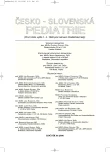-
Medical journals
- Career
Dietary Habits of 9–10 Years Old Children from Pilsen City
Authors: D. Müllerová 1; A. Aujezdská 1; L. Müller 2
Authors‘ workplace: Ústav hygieny Lékařské fakulty, Univerzita Karlova, Plzeň vedoucí doc. Ing. Z. Zloch, CSc. 1; Fakulta aplikovaných věd Západočeské univerzity, Plzeň vedoucí prof. Ing. J. Psutka, CSc. 2
Published in: Čes-slov Pediat 2006; 61 (9): 502-505.
Category: Original Papers
Overview
Specific objective:
To measure contemporary dietary habits of the cities’ children from elementary school, in the age 9–10 years.Examined sample and used methods:
Standardized food frequency questionnaire (FFQ) was administered and collected from a randomly selected sample of 400 children within age range 9–10 years from Pilsen elementary schools. Respondent rate for FFQ was 91.0% (364 children). Results: Results showed insufficient intake of vegetables and over consumption of sweats and soft drinks. In comparison to Food guide pyramid cereals created 4.5, vegetables 0.8, fruits 2.7, milk and dairy products 4.5, meat 1.8, sweats and soft drinks 1.9+1.7 and fats 2.5 portions per day.Conclusion:
Study confirmed non-healthy characteristic of dietary habit especially in sense of low content of vegetables and high frequency of intake of caloric dense food.Key words:
dietary habit, school children, food pyramid
Labels
Neonatology Paediatrics General practitioner for children and adolescents
Article was published inCzech-Slovak Pediatrics

2006 Issue 9-
All articles in this issue
- Apolipoproteins in Cherokee Children and Adolescents
- National Cholesterol Program in Children’s Population in Slovakia and Its Contribution
- Non-cholesterol Sterols in Healthy Children and Low Cholesterol Dietary Treatment of Children Suffering from Familial Hypercholesterolemia
- Dietary Habits of 9–10 Years Old Children from Pilsen City
- Primary Disorders of Lipid Metabolism in Children – Our Experience
- Food Supplements with Fish Oils – The Composition of Fatty Acids
- Does Artificial Suckling Nutrition Pose a Risk of Atherosclerosis at the Adult Age?
- Evaluation of Increased Levels of Neonatal Screening TSH in Slovakia
- What is New in the Diagnostics and Treatment of Arterial Hypertension in Children?
- Czech-Slovak Pediatrics
- Journal archive
- Current issue
- Online only
- About the journal
Most read in this issue- Primary Disorders of Lipid Metabolism in Children – Our Experience
- Does Artificial Suckling Nutrition Pose a Risk of Atherosclerosis at the Adult Age?
- Food Supplements with Fish Oils – The Composition of Fatty Acids
- National Cholesterol Program in Children’s Population in Slovakia and Its Contribution
Login#ADS_BOTTOM_SCRIPTS#Forgotten passwordEnter the email address that you registered with. We will send you instructions on how to set a new password.
- Career

